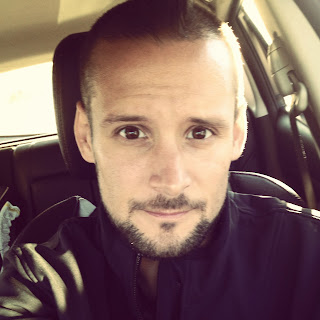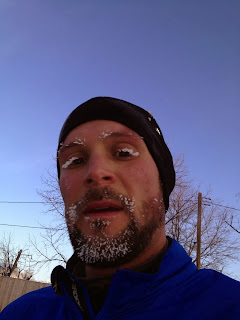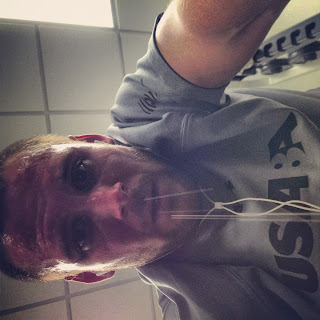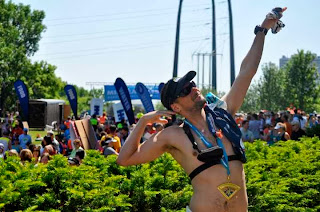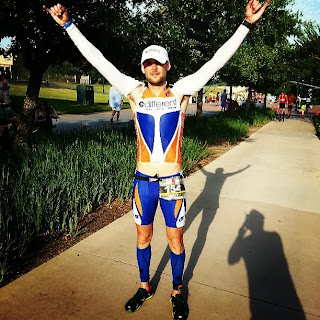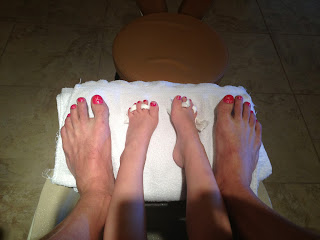Friday, February 28, 2014
Trust someone else
When I started running I took a 12 week half marathon training program and condensed it to 4. When I finished the race limping I wanted to do a full marathon. I researched different programs to find the right one for me. I found some that seemed to work and changed them as I saw fit. What experience did I have in creating and modifying training plans...refer back to my first sentence.
A lot has changed since 2009; experience, injury, divorce, mohawk, wisdom, The Living Athlete. Life changes, priorities change, goals change. So I too continue to change.
I made the decision to hire a coach. I've placed my trust in this coach with a single goal and many circumstances surrounding that goal. Circumstances: 50% of my days are non-negotiable children time from the hours of 6 am until I go to work and after work until they go to bed - non-negotiable. On my weekends with my children this training window narrows to outside the hours of 6 am until 8 pm. Mondays, Tuesdays and every other Friday, Saturday and Sunday - kill me. I work a full-time job 8-5 Monday - Friday, two of those lunch hours I'm at TRX at the YMCA which leaves Tuesday, Wednesday and Thursday over my lunch break for something.
The goal I'm partnering with my coach to achieve: #1 be available for any and all training and build up races for a good friend who's training for Ironman. This particular athlete has a lead foot on the bike and has been known to run marathons...many of them.... on back-to-back days. I want to be at my best so he can be at his. Once IMWI is in the books, maybe I'll find my own race to burn up some of this training on, but until then, my first training day is tomorrow. Here's to 2014 and a new way of doing the old things I've always done before, but doing them more better ;-)
I have the coach I want giving me the training plan I need to accommodate the life I want to live with the support I have. I have two simple words to push forward with this year that were passed to me by someone very special... I'm Ready!!
Sunday, February 23, 2014
My new rule to live by
Demons, skeletons, baggage... call it what you want, we all have it. There are conversations that come up that give us that tingle, our stomach drops, palms sweat, nerves kick in. As those conversations may continue and dangerously approach, our bodies may kick in some endorphins as we go "fight or flight" mode. Then it happens, that one question that we have steered clear of, done everything in our power to avoid is about to get asked. Now what?
Maybe we have started a new dating relationship or maybe we've been in a long term relationship, maybe even married. What's our biggest secret? What is it that we are so sure of that if the person sitting across from us knew, they'd run away? What are the three things that we are so certain would eliminate us from being a partner that we guard and hide? Or the three things that we've only told our best of best friend but would never dare to tell our partner out of fear?
As this fear exists, what conversations do we avoid? What words are out there that at any moment we hear one, our attention gets quickly diverted to the source? If a conversation or question may touch this fear what do we do avoid it... quickly remove ourselves from that conversation...head to the bathroom...change the subject? What behaviors have we adapted to avert the risk? What relief falls upon us when a potential conversation that may uncover this fear goes in another direction and our secret lives another day? A sigh... a deep breath, a thank you God..knock on wood?
As these fears exist, what is it that we are afraid of? Are we afraid that our partner would look at us differently? We afraid that the person we love won't love the person we actually are? Are we truly showing this other person who we really are if we conveniently find ways to avoid certain conversations? Who is it that this partner loves?...us...or this projection of us that we created to hide our baggage... an alternate us that we think is the us that is worthy of love?
Now, what if our partner has fears just like we do? Who the hell are we?
What if we laid those demons, skeletons and baggage on the table? What if we took those three things we fear most and made those the first things we shared with our new special person? I don't mean share in a 30,000 foot level share or a tap-dance around them like we've done so many times before, I mean share, say what it is and own that those three things are part of us. Are we scared if we did that, they wouldn't like us? Scared that they'd turn and run? Then don't tell them and hope we never have to talk about it. Who is it we want this person to love? us? or fearful secret us? Let's say we lay it all out there and let's say they turn and run. . . was it that bad? What did we loose?... the opportunity at a relationship of fear? What if we tell them? What if we just started a relationship with a person who knows the worst imaginable things about us and at the end of the conversation they are still sitting there?
What if they follow our lead and at the end of the night, both of us are still sitting there? Imagine that beginning...
What if we're in a relationship of fear and hiding skeletons? What if we opened up and shared? This person tells us they love us each day? They tell us they love us no matter what? Isn't this no matter what? What if we tell the person and they run? What if we tell them and they say they will never forgive us? What if they tell us those things are so bad they can't be with us? Ask them what their fears are because if we've never shared them, they probably haven't either...
Monday, January 20, 2014
I can't tell you the answer
I can only ask you the question; did you live your dream today?
Peel your layers back, open up, give yourself, come apart all to become whole.
Love yourself by living your dream.
Namaste
Monday, January 13, 2014
Something happened today...
Something happened today and you may not have even noticed.
The sun still came up.
Drank your cup of coffee.
Drove to work.
Maybe it happened so fast you missed it.
Blinked and it passed by.
Afraid to notice.
Got too busy.
Today was the most important day of your life, did you miss it?
did you live it
did you love it
would you do it again
Your life starts now, go live it.
Friday, December 27, 2013
What you see is what you give
Over the last couple years I’ve had the privilege to guide
visually impaired and blind athletes for various races and training
rides/runs. When I describe this to
people they offer a gracious pat on the back followed by stating “I’d never be
able to do that, I’m too______.” Fill
in the blank with anything you can think of: slow, inexperienced runner, never
guided before….so on and so forth.
What I’ve come to realize over this time span I’ve been
guiding is that it has less to do with my physical abilities and more to do
with my ability to give. I understand
that if I’ve never run before that guiding a marathon is something I shouldn’t
jump in to, but my point is that with the abilities we already have within us,
any one of us can give as a guide.
Early morning December 8th on a bus covered in
snow in sub 30 degree temperatures in California, I overheard a conversation
between a first time guide with an experienced visually impaired runner. The guide looked the part of a runner; trim,
fit, long legged – all the features that were irrelevant to the athlete he’d
soon be tethered to for 13.1 miles. As I
listened in to their conversation I quickly knew their first run together would
go smoothly. The guide, who seemed a
little nervous at first, was asking question after question. Asking the athlete’s preferences; which side
of the athlete to run to, how far ahead or behind he’d prefer he guided, what
sort of cues he’d prefer. As the guide
asked more questions I could hear the calmness in the athlete’s voice. The athlete was becoming more at ease as he
learned of the care and concern and attention to detail his guide was giving
him with the line of questioning; with the calmness of the athlete came the
calmness of the guide.
In my guiding experience, my conversations with visually
impaired/blind athletes and from my conversations with other guides, here is the
best list I can come up with for qualities necessary for being a guide:
1.
Be humble and ask questions – there are no
stupid questions, you won’t be looked at as ignorant or arrogant if you’re
asking questions to learn more about the athlete you wish to help.
2.
Be prepared personally – have your shit together
for you, be spot on in your packing to travel, the items you need to run and
support yourself through the race. If you forgot something, identify and take
care of it quickly so you’re not creating an emergency. Imagine if you’re about to travel through the
Amazon jungle led by someone you’ve never met only to have them show up and say
“I forgot my compass”. Your panic is
their panic.
3.
Be available – make yourself available to the
athlete ahead of the race, give them an opportunity to ask you questions so
that they may find comfort in being familiar with their guide.
4.
It’s not your race – yes you are out there, yes
you do have the opportunity to register for the race and get an official time,
but when you’re guiding someone during a race, they come first. I’m not suggesting putting yourself in any
risk or danger, but I do all I can to let the athlete know I’m there for
them. I’m not suggesting that it’s not a
team effort, it is, using the distinction of it not being about me helps me
mentally prepare, train and be ready to be as attentive as I can be come race
day.
5.
Don’t be an interruption - When I run my races
it’s always my goal to have chunks of miles that seem to pass by
effortlessly. Somehow I’ve gone from
mile 8 to mile 12 and didn’t even notice.
I never know when that’s happening to the athlete I’m with so I always
keep that top of mind to not break it up if I can help it. That’s how I navigate through other runners
during the race; plan ahead, make subtle adjustments instead of a big grab or
pull. If any quick or sudden adjustment
is needed I try to preface it with a verbal warning.
6.
Pay attention to detail – how much detail
depends on the athlete. Any time I guide
someone new I like to find out how much information they want. I error on too much than too little. I let the athlete know to tell me to shut up
if I’m providing too much feedback.
This is by no means an exhaustive list of items but I feel a
good start. I can’t reiterate enough how
none of the requirements have anything to do with your personal athletic
ability. Just like going to any running
race there are slow runners and fast runners; there are slow VI/blind runners
and there are fast VI/blind runners and most are in some need of a guide. It’s not just races, it’s getting prepared to
get to the starting line, think of the miles you logged training for your last
race, then imagine doing a high percentage of those miles on a ‘dread-mill’
because there were lack of guides to run with.
I encourage you to put yourself out there, reach out to local groups
that provide services for the visually impaired community, contact the local
schools, perhaps there’s a school for the blind in your area. Facebook has a great group that has grown to
over 425 members called “Running eyes, bringing Guides & Visually Impaired
runners/joggers together”.
While out in California, for the California International
Marathon, the event I’ve looked forward to for the two years I’ve gone out to
guide is the pre-race dinner on Saturday night.
During the event Richard Hunter, who spends countless hours and time in
conjunction with USABA doing fundraising, arranging housing, guides, travel and
anything else an athlete needs, got up to speak . In his brief talk about his bike crash this
summer, his recovery and the impact his fellow athletes have had on him he had
a great quote “focus on what you can do and not what you can’t.” That’s my advice to anyone interested in helping
others in athletics, if you want to help, there is a way and it has nothing to
do with how fast you are.
Tuesday, November 5, 2013
Put me in coach
Everyone has their reasons for choosing to participant in
races; health, competition, personal growth ….. whatever the reason, the fact
of the matter is there is a need to get some guidance. Personally I’ve never gone out and hired a
coach, I’ve researched on my own and spent time working a plan that made
sense for me. I’ve spoken to many
coaches, seen their training plans but never pulled the trigger on partnering
up. Each coach is unique, there is no
coach that’s one size fits all and there certainly isn’t a one size fits all
athlete. Every athlete’s situation and
circumstances are different, it’s this difference that should drive we athletes
to spend time getting to know potential coaches and interviewing each other
before jumping on board with whoever is popular, the cheapest or who most of
your friends go with. I wanted to
provide some things to consider if you’re looking in to stepping up your
results or looking for guidance hiring someone.
Group vs. coach; in my area where there is a local Ironman
race there are an abundance of coaches and groups. It’s important to distinguish between the two
as a starting point of the selection process.
Training groups are just that, groups that use their size and number as
a means to “never train alone”. There
are varying levels of groups from the informal group that maintains an email or
Facebook list to keep all it’s members up to date with places, times and type
of workouts that are occurring. Often
times the groups are organized to help people come and go as they need if
they’ve built or using a training plan acquired outside a coach. There are more organized groups that are
normally associated with running/triathlon stores. All members of the group pay the same price,
get the same gear and discounts and also get the same training plan and
schedule. Your life and the other
members of the group lives are all structured and laid out for you to
follow. These groups flourish with first
timers whether its first time 5k runners or runners looking to step up to
longer distances or even triathlons. The
groups have proven success with getting people to the finish line and helping
those who may not be organized or motivated to research on their own, but they
also bring in a team feeling of being a part of something larger. Although the training plans are all the same
the group organizer recognizes the varying ability of the athletes and have
varying ways to handle that so all in the group may train at their preferred
pace. I feel these are ideal for those
who are ‘first-timers’ with any race type; triathlon, 5k pick a race type. The group and getting to know people adds accountability. The structure helps build the habits of
training more and there is normally access to “coaches” within these
groups. The experience and
certifications of these group coaches may vary but in general it’s expected
they add value by being there and answering questions regarding nutrition, pace
or anything else you can think of. The
downside to these groups is in the structure and customization of the work
outs. If the group workouts all take
place on Wednesdays and Sundays and one of those days will never work for your
schedule, then you may not receive the full benefits of the group. If these workouts are supported in some
manner with hydration and nutrition on the workout routes and you have to miss
one or some of the workouts, then there is a benefit that’s been paid for but
not used. Furthermore, if you really
want to focus on getting a PR, your only option to do so is to work within the
group and it’s structure. For example,
many running groups will have pacers running a specific pace for the training
runs, if you’ve done races at an 11 min/mile pace and you want to get faster
you’re only choice within the group is to force yourself to hang with a faster
group. This certainly may work but may not
make the most sense.
Selecting a coach over a group – if you are someone who
needs reassurance or wants to be more confident in a training plan’s ability to
carry you to the finish, a coach may be a better option. With coaching you have an individual that
knows you, knows your goals and creates a specific plan custom to you. There’s ongoing discussion and feedback
between coach and athlete to continue to treat the training plan as a
living/growing GPS navigation. Any
hiccups or detours and the two of you are right on it to continue to give you
peace of mind and confidence you’re on the right track. If you’re an experienced athlete who’s done
races before and wants to focus on knocking out PR’s, a coach will normally
suit you better than a group.
Selecting a coach – a coach isn’t a coach isn’t a coach. .
. As we do with buying new running shoes
we should do with a coach. Try it on,
walk around a bit, get familiar with the nuances and take them for a test spin
before purchasing. If you’re going to
work with a coach, you’re going to have an investment of money so choose
wisely. All coaches will provide a work
out plan/schedule for you and that plan should be unique to you, your abilities
and goals. Coaches will have different
processes to start whether it’s an interview to learn your finish times and
quantity of races or to emphasize an evaluation of your form; gait analysis,
stride, swim stroke and spinning technique- this type of coach helps find ways
to make you more efficient and maximize your efforts. All coaches will most likely have different
systems in place that may operate like part of the group training mentioned
above. Organized and supported training
runs or rides, and group meet ups are common examples. This of course isn’t the case with a coach
that is virtual or remote from afar. The
“virtual” coach is just as accessible as someone in your town, but there is no
face-to-face component and will most likely focus on the plan itself. All
coaches will have certifications of some sort or a great deal of experience,
they will likely differ slightly in how they put it all together typically
based on their background and preferences.
For example some coaches are researching the benefits of high intensity
training as it relates to endurance athletes.
These coaches focus on intense short burst weight lifting as a means to
maximize the body’s ability to prepare for the beating and punishment of
running a marathon. This type of
training may require less overall hours spent, but when there is a workout, the
workouts are intended to have you operating at a vigorous level. Other coaches may balk at the idea that short
burst intense workouts make any sense for endurance athletes as they prefer a
methodology that focuses on maximizing time running and little to no core or
weight room work outs whatsoever.
If you’re considering a coach or group, the best advice I
could give is to ask lots of questions, forget what your friends are doing and
talk with different coaches openly and honestly about your goals, your
situation, how you best train and stay motivated, how they would describe the
athlete that is most likely to flourish with their help, what their core
philosophies are that they put in to their teaching, how they differ from other
coaches and how they are the same. If
you’re taking the time and spending the money to train for an event that you’re
considering hiring someone to help you get there, then do yourself a favor and
don’t stop asking questions or make assumptions, the person you choose to hire
will be a very important piece in your happiness as you prepare for your goal
race.
Thursday, October 24, 2013
Fail
…To be unsuccessful in achieving one’s goal. Succeed… achieve the desired aim or result.
I have completed many races, short and long, but I have
never truly enjoyed the success of any of them.
By definition one does not succeed until they reach their desired aim or
result. I never allowed myself the
opportunity to succeed because I truly never set a goal. I found it easier to train how I want, when I
want, that way, I never had to commit myself to a simple truth – I could fail
or succeed. I’ve realized this
simplicity isn’t so simple.
As a new runner in 2009 I had never done a real running race
that wasn’t the 800 meter in high school track.
I decided I could do a half marathon, when committing to running this
13.1 mile race my goal was to finish. As
I began training I realized finishing wasn’t enough for me, I wanted to do
better, I felt I could do better. But I
never defined better. I never said “Kelly,
you can run a 2:00 half marathon, so get your ass out there and train to it!” I finished the race, was happy to have
completed it, but it began my long list of finishing races but not really
succeeding.
After completing the half I was confident I could do a
full. Having never done a full, again my
default “goal” was to finish. As I
trained I began to get confident, believing and feeling I was capable of a
doing pretty well, but again, I never defined it to challenge and push myself
to meet a goal. Race day I had a
terrible race plan, it was hot, and I finished.
Happy to finish but it didn’t feel like success.
With each race I completed I had built in excuses on why not
to have a goal, or why my finish was a success, but those were the stories I
was telling myself. My second marathon
was a few months after my first – goal – be faster than the first marathon. Huh?
My first race I had a terrible race plan, I didn’t set a true goal to
finish and it was hot out resulting in a not so pleasant race experience or
time to challenge myself to, but now that was my measure for my next race? YUP! I
crossed the line in a time faster than the first.
First triathlon, no goal because I hadn’t done one before,
same with my first 10k, first half ironman, first ironman and so on and so
forth. I’m not saying the goal of
finishing is a bad goal, it’s a great goal for me or anyone. There have only been 4 races that I have
truly committed to that as a great goal but those weren’t my races, they were
either guiding an athlete for their race or running with a friend to help them
finish a race. Those were truly my
favorite races because my expectation was met.
For my personal races, that’s never happened because I’ve been afraid to
commit to a goal and doing whatever it takes to get it.
The day before guiding Ironman Wisconsin last year I signed
up for the 2013 race. Many things
changed between that September and this one; training, family life, friends,
support, marriage. I even crashed on a
bike ride and managed to break my collar bone 7 weeks before race day. I didn’t have a goal other than my normal
bullshit – be faster than the previous race in which you didn’t set a goal
for. The great thing about setting arbitrary
goals is they can be made more specific or modified when you most need it. A week before race day I made a choice, I set
a goal. My race goal was 12 hours. 12 hours was the time I thought I was able to
complete Ironman Texas earlier in May, but never committed to. I went 13 hours there but thought on a cooler
day like I’d get in Wisconsin I could truly do 12. So there it was, 4 years in to racing and I
finally set a goal. I had every reason
to pick an easier goal, to give myself a break, to do what I had always done
but I didn’t.
I swam, biked and got 8 miles in to the run then had my
first DNF. Coming off the bike I needed
just under a 4 hour marathon to get my twelve.
I ran as far as I could and then I ran some more. I’d walk the aid stations and get food and
water and then run again. Then there was
no more running, no more moving. At
first I crouched, then laid there. Race
over. Coming off the bike I had 9 hours
to finish 26.2 miles on my feet. I could
have started walking, I could have jogged, I could have played it safe, but
that wasn’t my goal. I could have taken a
specific goal and changed it on the fly to something attainable, but I committed.
My greatest athletic success was failing that day.
Subscribe to:
Posts (Atom)
.JPG)


